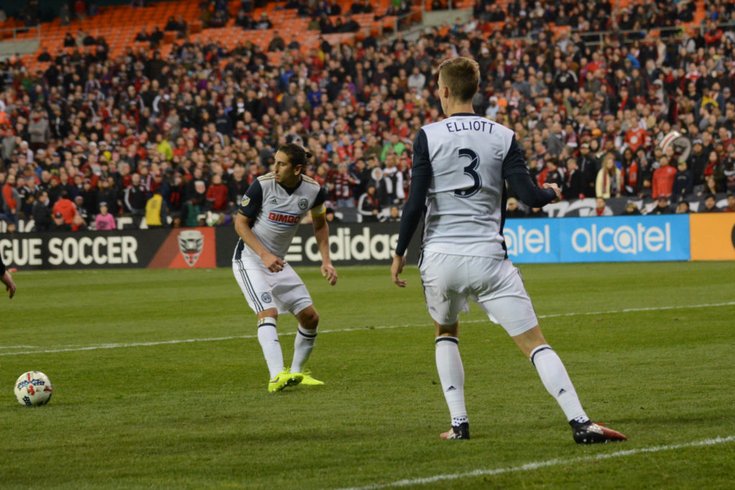
April 07, 2017
 \Mikey Reeves/Philly Soccer Page
\Mikey Reeves/Philly Soccer Page
Jack Elliott, the 77th overall pick in the MLS SuperDraft, came off the bench to make his Philadelphia Union debut last Saturday.
A fourth-round selection in January, Jack Elliott was the last member of the 2017 draft class to sign with the Union, but the first to actually play for the senior team.
His rapid rise is fascinating, with early bench appearances made possible because of injuries to center backs Josh Yaro and Ken Tribbett.
With Tribbett playing for Bethlehem Steel last Saturday, Elliott traveled with the first team to Washington, then made his MLS debut when starter Richie Marquez left the game at halftime.
"It was great," the London-born Elliott said of his first Union appearance. "Obviously you're nervous at first, but I think I settled into the game."
Elliott played a smooth second half and didn't have to do much defensively as the Union picked up the attacking pace and controlled possession in an eventual 2-1 loss.
The intensity, he says, was the most significant change from the college game.
"It was definitely higher than what I've had in college, but I adapted to it and thought I did fairly well," Elliott said. "Probably the pace of play and the quality of the players obviously (is the biggest difference from college). Everyone is a lot better, and any mistakes you make get punished."
.@jackells95 became the first 4th-rounder from the 2017 SuperDraft to make an appearance this year.
— Philadelphia Union (@PhilaUnion) April 3, 2017
Story: https://t.co/H9YAdTR9yH pic.twitter.com/UELYqCcZP4
Elliott was invited to the MLS combine but stayed on the draft board until the Union used the 77th overall pick on the 6'5" center back.
He's tall and strong in the air, but also relatively calm on the ball. Elliott's game is similar to that of Axel Sjoberg, the 6'7" Colorado Rapids defender who came through the 2015 MLS draft and is now anchoring one of the league's best defenses.
Elliott spent four years at West Virginia University after being recruited to the school by assistant coach Dan Stratford, a fellow Englishman who saw him play in London.
"He was from my local area and he saw me play at Christmas before I came over in 2012, 2013," Elliott explained. "He told me after one game that there was an opportunity there, and that if I wanted it I could go over (to the United States). He talked me through it. He had been there and he had managed to go to the pros as well with D.C. United. I trusted in him and ended up at West Virginia."
Stratford was a four-year starter for the Mountaineers and holds school records with 85 appearances and 27 assists. He was drafted by D.C. in the 2008 Supplemental Draft and played five times for the club before joining Scottish side Inverness in 2009.
The head coach, Marlon LeBlanc, has been in Morgantown since 2006. He's coached players like Ray Gaddis, the longtime Union fullback, and former Union draft pick Eric Schoenle. Harrisburg goalkeeper Nick Noble also played for the Mountaineers, along with Seattle draft pick Andy Bevin and former Toronto FC forward Jarrod Smith.
"It's a good coaching staff there," Elliott said. "Over the years I've had the chance to play under a few other assistant coaches and they're all good, experienced coaches who taught me a few things about the game. 'Strats' told me to play with my brain and Marlon was all about work ethic. It just shows you that if you work, then you're going to get to the top."
Elliott says the toughest part of moving to America from London was adjusting to the seasons and adapting to a new practice load. He says the Mountaineers would train two or three times a day in the summer heat, which was something "you don't see in England."
His path is similar to that of Union teammate Fabian Herbers, who left Germany to enroll at Creighton back in 2013. They join a growing list of foreigners, like Sjoberg and Jack Harrison, who are coming to America for college soccer, then earning a place in MLS.
Now a professional footballer, Elliott is also just a few weeks away from completing his degree in Management Information Systems.
"It's especially good for guys who want to get a degree and carry on playing," said Elliott of his foreign peers. "Here you can go to college, get your degree, and still make it to the next level. In Europe, it's a bit more cut and dry early on."